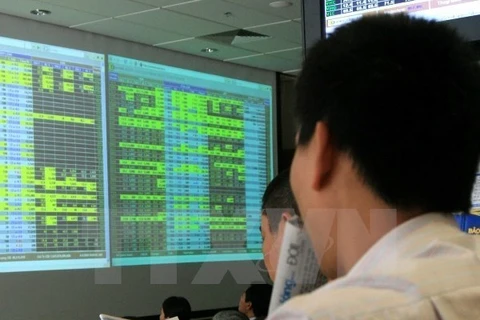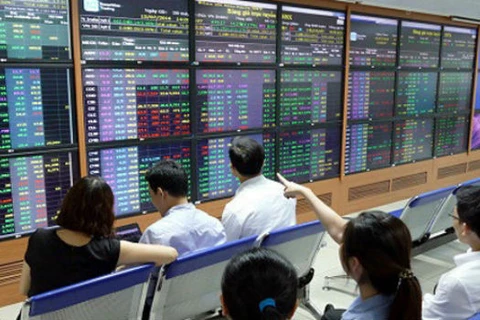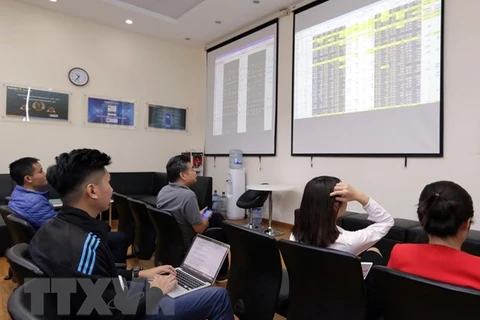 Minisiter of Finance Dinh Tien Dung holds talks with Philip Hammond, UK Treasury Minister within the framework of the investment promotion conference in the UK (Photo: BTC/Vietnam+)
Minisiter of Finance Dinh Tien Dung holds talks with Philip Hammond, UK Treasury Minister within the framework of the investment promotion conference in the UK (Photo: BTC/Vietnam+)
Hanoi (VNA) – Seizing the opportunity from the Vietnam - EU Free Trade Agreement (EVFTA), in the early days of July, the Ministry of Finance and domestic businesses launched a series of programs to promote indirect investment (FII) at world’s major financial centres.
FII inflows continue to be net in Vietnam
He said the foreign indirect investment (FII) in Vietnam reached 1.28 billion USD in the first six months of 2019.
Between 2016 and 2018, the FII sector continuously net purchased local stocks worth 1.98 billion USD per annum, he said.
He added that Vietnam’s stock market has continued growing in scale and liquidity in recent years with the total market capitalisation touching nearly 4.3 million USD as of the end of June 2019, equivalent to about 78 percent of the gross domestic product (GDP) in 2018, up 11.2 percent against the early 2019.
After 19 years of operation, the stock market has basically completed its structure and diversified products such as stocks, bonds, fund certificates, derivatives and most recently covered warrants – securities that have collateral assets issued by securities companies, Dung said.
Vietnam’s stock market has also been added to the watch list for possible upgrade to Secondary Emerging Market by FTSE Russell, a leading global provider of financial services, he added.
According to Dung, these achievements were attributed to the Government’s efforts in improving policies to develop the stock market and attract overseas investment in the field.
The draft revised Law on Securities has been submitted to the National Assembly to improve policies to develop the stock market in a stronger and more sustainable manner.
In March 2019, Prime Minister Nguyen Xuan Phuc approved a project restructuring the securities and insurance markets through 2020 with a vision to 2025, aiming to develop the stock market into an important capital channel for the economy in the medium and long terms as well as increase integration into regional and global markets.
The Ministry of Finance and the SSC have been actively implementing policies to upgrade the stock market from marginal level to emerging one according to the MSCI Emerging Markets Index.
Along with improving the macro policies, the Government has been continuously promoting equitisation and divestment of State-owned enterprises in association with the listing and registration of trading on the stock market, Dung said.
Attracting selective investment
At the Conference on Financial Investment Promotion in the UK organized by the Ministry of Finance of Vietnam in the early days of July, hundreds of representatives from British corporations, companies and large investment funds such as Ashmore, HSBC AM, JP Morgan, Swiss Re Group, RBC Global Asset Management, Amundi Asset Management ... were interested in attending and had about 50 discussions, working bilaterally between partners and securities management agencies, insurance and some of Vietnam's major businesses.
In order to attract the attention of the British business community and investors in particular and the EU in general, Minister of Finance Dinh Tien Dung affirmed that the message of the Vietnamese Government was always consistent with the initiative policy of international integration. Vietnam is a country with high economic openness with efforts to realize economic growth (in the period of 2016-2020) with an average GDP of 6.7 percent – 7 percent/year, along with sustainable development.
 The State Securities Commission signs a cooperation agreement with the Association of Accountants and Notaries in the framework of the Conference on Financial Investment Promotion in the UK (Photo: BTC / Vietnam +)
The State Securities Commission signs a cooperation agreement with the Association of Accountants and Notaries in the framework of the Conference on Financial Investment Promotion in the UK (Photo: BTC / Vietnam +)
"Golden" opportunity of Vietnam
Pham Hong Son, Vice Chairman of the State Securities Commission said that the Government has drastically directed the implementation of policy solutions to upgrade the stock market to the emerging market. Quantitatively, the Vietnamese stock market can meet the conditions, but there are still some issues about market opening as well as transparency in information disclosure.
To address these issues, in March, the Prime Minister officially approved the project "Restructuring the stock market and insurance market to 2020 and orientation to 2025" with comprehensively restructure so that the stock market truly becomes an important medium and long-term capital channel for the economy.
In addition, the amended Securities Law was submitted to the National Assembly at the seventh session, XIV tenure with many new points being added and amended in the direction of perfecting the policies for the stock market to develop strongly and more sustainable./.
























